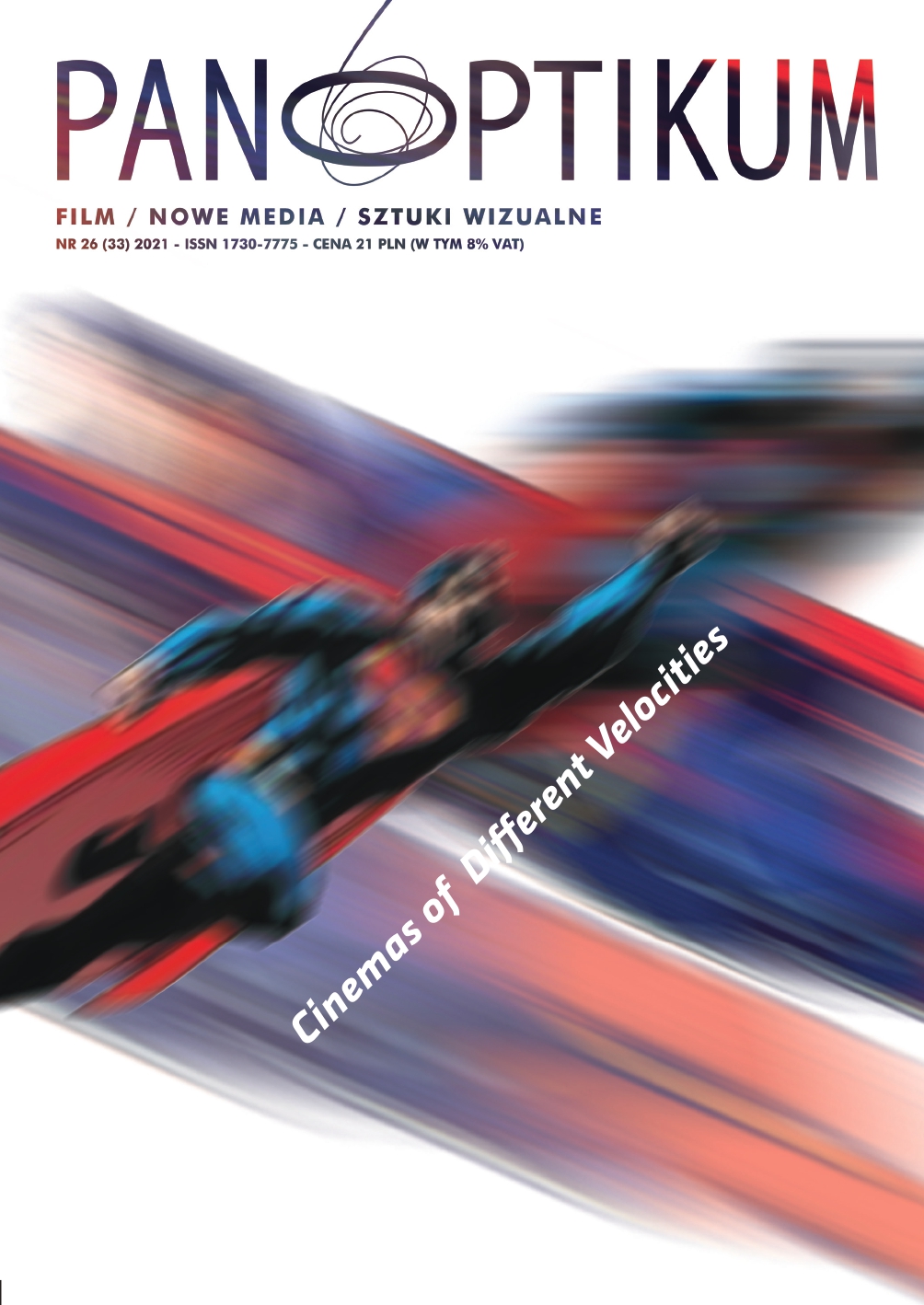Time Flows: Rhythm in Slow Cinema
DOI:
https://doi.org/10.26881/pan.2021.26.11Słowa kluczowe:
slow cinema, time, rhythm, embodimentAbstrakt
In her article, the author describes slow cinema as one of the most important tendencies in contemporary art-house cinema, simultaneously focusing on its temporal emanations. The text emphasizes the notion of rhythm and divides it into two subcategories: external and internal rhythm. The latter is close to the embodied experience, therefore it influences viewers affectively, as a somatic resonance. It enables a spectator’s intensive engagement in slow films. The author’s argumentation is based on rhythm research and existential phenomenology
Downloads
Bibliografia
Aumont, J. (2017). The Experience of a Gaze Held in Time: Interview with Jacques Aumont. “Senses of Cinema”, no 83, http://sensesofcinema.com/2017/film-studies/jacques-aumont-interview/. (accessed on 31 May 2021).
Crary, J. (2009). Zawieszenia percepcji. Uwaga, spektakl i kultura nowoczesna. trans. Zaremba, Ł., Kurz, I. Warszawa: Wydawnictwa Uniwersytetu Warszawskiego.
Dziadek, A. (2014). Projekt krytyki somatycznej. Warszawa: Wydawnictwo Instytutu Badań Literackich.
Flanagan, M. (2008). Towards an Aesthetic of Slow in Contemporary Cinema. “16:9”, no. 29, http://www.16-9.dk/2008-11/side11_inenglish.htm. (accessed on 31 May 2021).
Helman, A. (2007). Francuska teoria w kręgu awangardy. in Helman, A., Ostaszewski, J. Historia myśli filmowej. Podręcznik. Gdańsk: Słowo/Obraz Terytoria.
Henry, M. (2012). Wcielenie. Filozofia ciała. Trans. Frankiewicz, M., Adamski, D. Kraków: Homini.
Irzykowski, K. (1977). X muza. Zagadnienia estetyczne kina. Warszawa: Wydawnictwa Artystyczne i Filmowe.
Koepnick, L. (2014). On Slowness: Toward an Aesthetic of the Contemporary. New York– Chichester: Columbia University Press.
Koepnick, L. (2017). The Long Take: Art Cinema and the Wondrous. Minneapolis–London: University of Minnesota Press.
Loska, K. (2019). Apichatpong Weerasethakul – o polityce i widmach. “Kwartalnik Filmowy”, nr 105–106.
Markowski, M.P. (2014). Emocje. Hasło encyklopedyczne w trzech częściach i dwudziestu trzech rozdziałach (nie licząc motta). in Pamięć i afekty. Budrewicz, Z., Sendyka, R., Nycz, R. (eds.). Warszawa: Wydawnictwo IBL PAN.
Merenciano, L. (2014). Semiotics and Rhythm of film: Hollywoodian Cinema Compared to Cinema Novo. “Semiotix”, nr 12, http://semioticon.com/semiotix/2014/06/the-semiotics -of-hollywoodian-cinema/. (accessed on 31 May 2021).
Mitry, J. (2000). The Aesthetic and Psychology of the Cinema. trans. King, Ch., Bloomington-Indianapolis: Indiana University Press.
Pearlman, K. (2013). Cutting Rhythms: Shaping the Film Edit, New York–London: Focal Press.
Pokropski, M. (2013). Cielesna geneza czasu i przestrzeni. Warszawa: Wydawnictwo IFiS PAN.
Punday, D. (2003). Narrative Bodies: Toward a Corporeal Narratology. New York–Basingstoke: Palgrave Macmillan.
Schrader, P. (2017. Paul Schrader: Slow Cinema Is Dying a Slow Death, rozm. K. Ritchie. https://nowtoronto.com/movies/news-features/paul-schrader-slow-cinema-is-dying-a-slow -death. (accessed on 31 May 2021).
Sobchack, V. (1992). The Address of the Eye: A Phenomenology of Film Experience. Princeton: Princeton University Press.
Stańczyk, M. (2019). Czas w kinie. Doświadczenie temporalne w slow cinema. Kraków: Wydawnictwo Uniwersytetu Jagiellońskiego.
Syska, R. (2014). Filmowy neomodernizm. Kraków: Wydawnictwo Avalon.
Syska, R. (2019). Kino artystyczne: Przeczekanie. „Ekrany”, no. 6.
Tarkowski, A. (2006). O rytmie, czasie i montażu. trans. Kuśmierczyk, S. in Europejskie manifesty kina: od Matuszewskiego do Dogmy. Antologia. Gwóźdź, A. (ed.). Warszawa: Państwowe Wydawnictwo Wiedza Powszechna.
Vogman, E. (2015). Politics of Rhythm: The Cinema of the Ukrainian Avantgarde. La Furia Umana, no. 24, http://www.lafuriaumana.it/index.php/57-archive/lfu-24/374-elena-vog- man-politics-of-rhythm-the-cinema-of-the-ukrainian-avantgarde. (accessed on 31 May 2021).

 Uniwersyteckie Czasopisma Naukowe
Uniwersyteckie Czasopisma Naukowe









